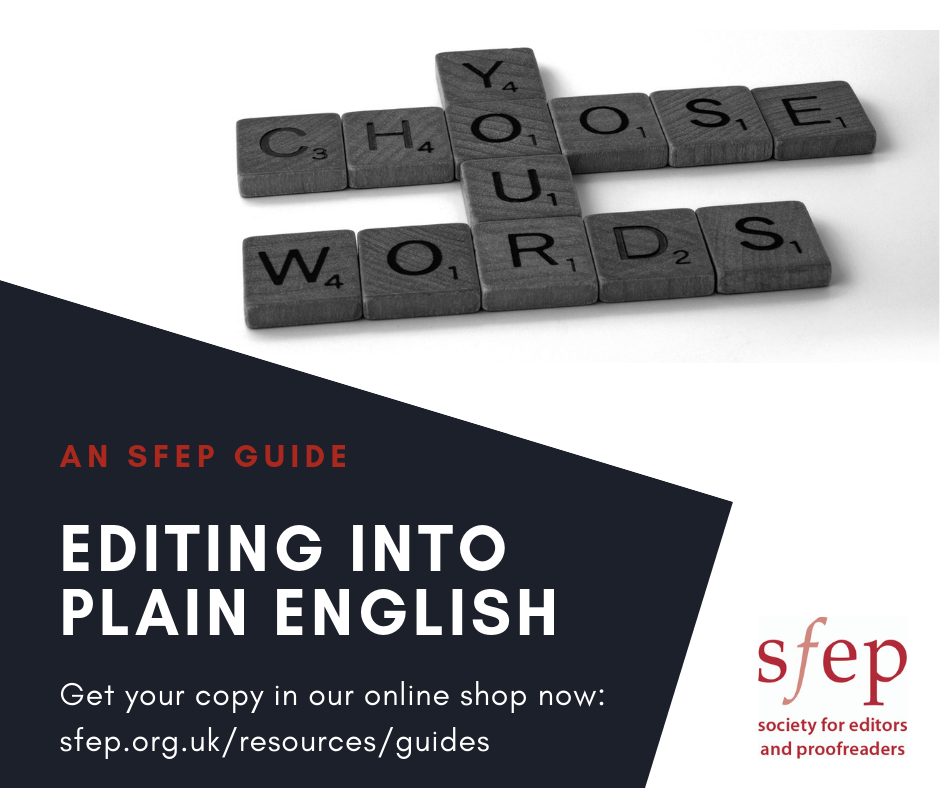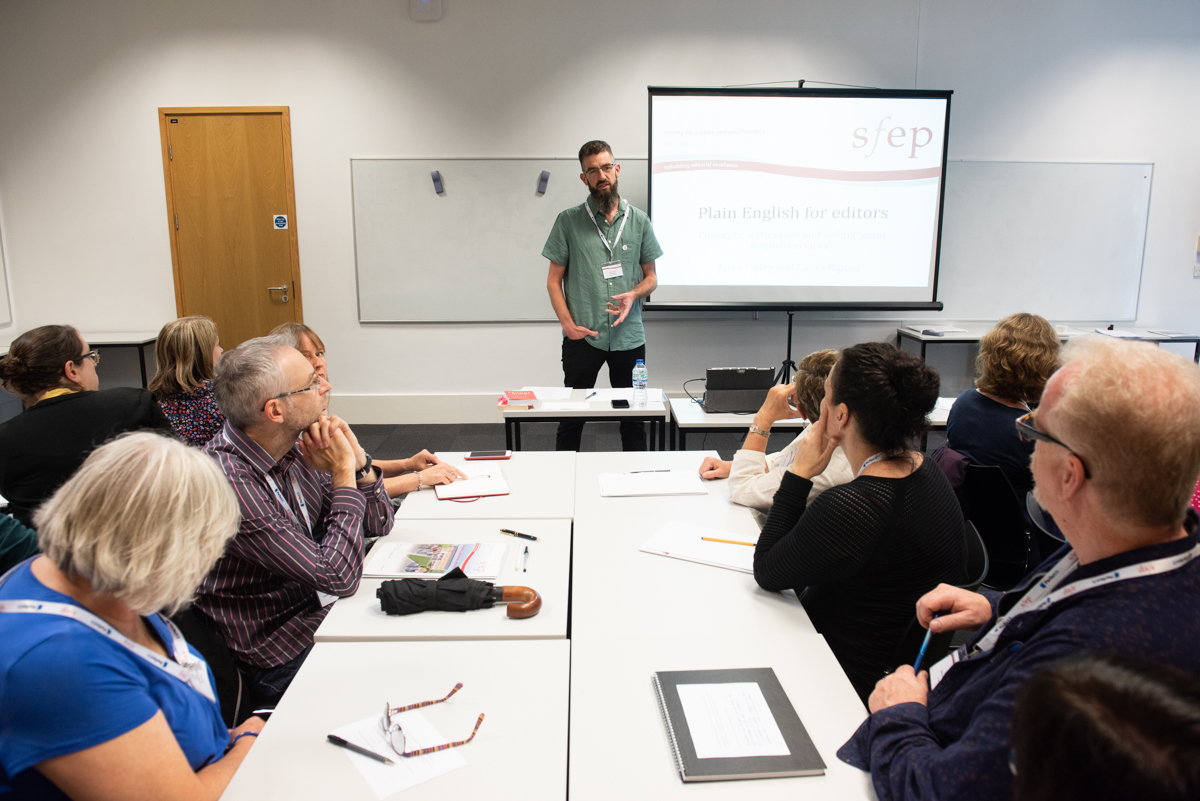By Laura Ripper and Luke Finley
Are you thinking of adding plain-English editing to your services? Perhaps you have done so already, and you’d like to promote your service to more clients. Maybe you work in-house for an organisation that uses plain English, editing your colleagues’ writing. Or perhaps you’ve been hearing more about this thing known as ‘plain English’ lately, and you want to find out what it’s all about.
If that sounds like you, you might be interested in two new resources:
- Editing into Plain English (second edition), an SfEP guide
- Plain English for Editors, a new SfEP online course
 Using plain English (also known as plain language) helps organisations fulfil their purpose, whether it’s to make a difference in society or to make a profit for shareholders. Organisations in the public sector have a responsibility to communicate clearly so that people can use public services, understand how decisions affect them and take part in public life. Researchers write plain-English summaries to make academic knowledge accessible to more people. And private companies use plain English as a marketing tool and to save time and money on sorting out misunderstandings.
Using plain English (also known as plain language) helps organisations fulfil their purpose, whether it’s to make a difference in society or to make a profit for shareholders. Organisations in the public sector have a responsibility to communicate clearly so that people can use public services, understand how decisions affect them and take part in public life. Researchers write plain-English summaries to make academic knowledge accessible to more people. And private companies use plain English as a marketing tool and to save time and money on sorting out misunderstandings.
As more organisations see the advantages of using plain English, more of them are working with language professionals to make sure their documents are genuinely easy to read, use and understand. And more editors are working outside traditional publishing for the kinds of clients who want support with plain English, either as well as or in place of a ‘standard’ edit.
Plain English is about much more than word choice and sentence length; anyone who provides plain-English support needs to know about all the guidelines, techniques and tools and when to use them. Most importantly, they need to use them in a balanced and nuanced way. That puts editors, who are experienced in considering the finer points of language use as well as the wider context, in a good position to help.
If you want to find out about the basics of plain-English editing, the updated guide is a helpful introduction to what’s involved. If you want to learn more and gain some practice, the new course will help you to build on the skills you already have and use them in the context of plain English.
Editing into Plain English guide
We’ve updated the original SfEP guide on plain English, written by Sarah Carr, to reflect how the market has changed since it was first published.
What does it cover?
The guide is an introduction to plain-English editing. It includes information about:
- What plain English is, and what it isn’t.
- Evidence for the benefits of using plain English.
- Training and qualifications.
- Plain-English services you could provide, and how to price them.
- Marketing your services and finding clients.
- Working with clients in practice, especially non-publishers.
- Software that can help.
- Useful resources.
What’s changed since the first edition?
We’ve updated the guide throughout, but in particular you’ll find new information on:
- Recent developments in plain English around the world, and which sectors are using it.
- How plain English benefits business clients.
- Ways to market your services and find clients.
- What to consider when discussing a project with a client.
- Resources and further reading.
 Plain English for Editors online course
Plain English for Editors online course
This new course looks at plain English from the perspective of editing. It explains how to use widely accepted guidelines to improve text that has already been written, and looks at the challenges involved.
Who is it for?
The course is for you if you:
- Already provide plain-English services and want to develop your skills.
- Want to branch out into providing plain-English services.
- Want to use plain-English techniques as part of your other editing services.
- Work in-house and edit colleagues’ writing.
What does it cover?
This course aims to explain what plain English is, give you the skills to use guidelines on plain-English editing with thought and care, and develop your understanding of how to market your services and deal with challenges. It covers:
- What plain English is, and what it’s for.
- The history of the plain-English ‘movement’ and more recent developments in uses and thinking.
- Six main guidelines for plain-English editing, from word choice to layout.
- Tools in Word and other software that can help, and the pitfalls to watch out for.
- The practicalities of plain English editing – working with clients, dealing with misconceptions and challenging texts, and marketing your services.
The course gives you plenty of practice in using the guidelines with careful judgement, considering the context, the reader’s needs and the client’s needs. This helps you to develop the skills needed to genuinely improve clarity and ease of reading, rather than applying a set of ‘rules’ that simply tick a box.
In short, if you’re an editor offering plain-English services – or hoping to do so in future – these two resources will make an essential contribution to your continuing professional development (CPD). And if you’re a client or commissioner of editing services, and making your copy clear and easily understood is one of your priorities, you can be confident that any editor who draws on these resources is well equipped to help you achieve this.
 Laura Ripper is a self-employed copy-editor and an Advanced Professional Member of the SfEP. She started out at Plain English Campaign in 2004, editing documents for private companies and public-sector organisations. After that she joined Foundations and then Digital Outreach – companies that worked with charities on behalf of the UK government. As an editor, she helped these companies communicate clearly with various audiences. She has also taught English as a foreign language in Russia and China. She has co-written the SfEP online course Plain English for Editors and the SfEP guide Editing into Plain English.
Laura Ripper is a self-employed copy-editor and an Advanced Professional Member of the SfEP. She started out at Plain English Campaign in 2004, editing documents for private companies and public-sector organisations. After that she joined Foundations and then Digital Outreach – companies that worked with charities on behalf of the UK government. As an editor, she helped these companies communicate clearly with various audiences. She has also taught English as a foreign language in Russia and China. She has co-written the SfEP online course Plain English for Editors and the SfEP guide Editing into Plain English.
 Luke Finley set up Luke Finley Editorial in 2013/14 and is an Advanced Professional Member of the SfEP. Most of his working life until 2014 was spent in the voluntary and public sectors, which gave him a keen interest in plain English and trying to persuade people to communciate more clearly. He also wrote and delivered various kinds of training. As an editor, he has presented on plain English at two SfEP conferences and is the co-author of (with Laura Ripper) the SfEP online course Plain English for Editors and (with Laura Ripper and Sarah Carr) the SfEP guide Editing into Plain English.
Luke Finley set up Luke Finley Editorial in 2013/14 and is an Advanced Professional Member of the SfEP. Most of his working life until 2014 was spent in the voluntary and public sectors, which gave him a keen interest in plain English and trying to persuade people to communciate more clearly. He also wrote and delivered various kinds of training. As an editor, he has presented on plain English at two SfEP conferences and is the co-author of (with Laura Ripper) the SfEP online course Plain English for Editors and (with Laura Ripper and Sarah Carr) the SfEP guide Editing into Plain English.
Head to the SfEP website to sign up for the Plain English for Editors course and to buy the Editing into Plain English guide.
Proofread by Joanne Heath, Entry-Level Member.
Posted by Abi Saffrey, SfEP blog coordinator.
The views expressed here do not necessarily reflect those of the SfEP.
